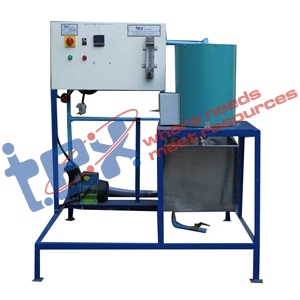

The Real PID Control Trainer is an advanced process control educational setup designed to study the working principles of Proportional-Integral-Derivative (PID) control in real-time industrial applications. This trainer helps students understand how PID controllers regulate parameters like flow, level, pressure, and temperature in process systems.
Ideal for Engineering Colleges, ITIs, Polytechnics, and Research Labs, this PID control lab trainer bridges theory with practical implementation by providing live visualization of control loop response, tuning, and stability analysis. It allows learners to experiment with different controller modes and tuning techniques using actual process signals.
The Real PID Process Control Trainer includes a control module integrated with a process simulation unit that enables experimentation on various control loops. It features a digital PID controller capable of operating in Proportional (P), Integral (I), and Derivative (D) modes independently or in combination.
Students can observe and compare system behavior in open-loop and closed-loop configurations, analyze transient response, and tune PID parameters to achieve desired control performance. The real-time process interface ensures hands-on learning through simulated pressure, flow, level, or temperature systems.
Built with industrial-grade instruments, this real PID trainer kit provides accurate and reliable results for laboratory experimentation. The modular design ensures easy operation, clear understanding, and long-term durability for repeated use in academic and research environments.
| Specification | Details |
|---|---|
| Power Supply | 230V AC, 50Hz |
| Controller Type | Digital PID controller with manual/auto mode |
| Control Modes | P, PI, and PID |
| Process Simulation | Flow, level, pressure, or temperature (selectable) |
| Sensors | Analog signal transmitters (4–20 mA) |
| Display | Digital display for PV, SP, and MV |
| Interface | Optional PC or SCADA integration |
| Construction | MS powder-coated frame with front panel layout |
| Safety Features | Overload, short-circuit, and overvoltage protection |
The Real PID Control Trainer provides students with real-world insights into how industrial controllers maintain system stability and performance. It allows learners to experiment with tuning parameters and observe their effects on transient and steady-state responses.
This trainer enhances understanding of control theory, automation, and instrumentation, making it ideal for technical training in process control labs. By offering hands-on exposure to real PID control systems, it prepares students for professional roles in industrial automation and plant control engineering.